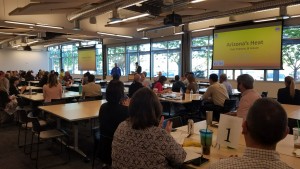 Temperatures are beginning to rise in our state. Most people probably remember the June heat wave last year, which brought on record temperatures. From June 12-27, 2017, temperatures reached 119 ° in Phoenix, 93° in Flagstaff, 120° in Yuma, and 116° in Tucson. Extreme heat will be upon us again soon.
Temperatures are beginning to rise in our state. Most people probably remember the June heat wave last year, which brought on record temperatures. From June 12-27, 2017, temperatures reached 119 ° in Phoenix, 93° in Flagstaff, 120° in Yuma, and 116° in Tucson. Extreme heat will be upon us again soon.
Our latest preliminary heat surveillance data identified more than 2,639 heat illness emergency room visits and 219 deaths from heat in 2016. Recently, our Environmental Public Health Tracking Program organized heat statistics combined with temperature data into our new Environmental Public Health Tracking Portal. New data from 2015-2016 have been added to help show historical county trends.
In order to prepare for this year’s extreme heat, stakeholders throughout Arizona gathered to discuss heat safety efforts in March. The workshop was made possible through a collaborative effort between the Arizona Department of Health Services, National Weather Service and Arizona State University. The workshop aimed to better connect the various organizations that help mitigate the impacts of extreme heat in our state. The hope was that connecting these entities would establish an expanded list of extreme heat collaborators; improve and create new working relationships; identify best practices, and highlight broader efforts within communities.
Eighty participants attended the workshop held in Scottsdale. Participants included non-profits, local government, public health, fire departments, universities, media outlets and emergency management. In collaboration with local media, participants reflected on solutions for preventing future cases of heat illness using investigative stories of incidents reported in the news last year.
One of the many solutions proposed was to work with improving advertising of cooling centers available near bus stops. These places are a great resource if you are unable to cool down at home during the hot summer days. A representative from a public transportation agency agreed that this improved advertising could be explored. Participants voiced a desire to maintain ongoing dialogue to further our efforts at reducing the number of heat illness hospitalizations and deaths. Plans are already underway for a future workshop to keep the positive momentum moving forward.









